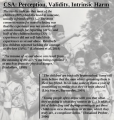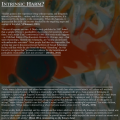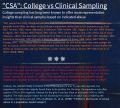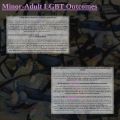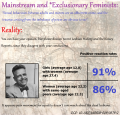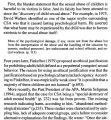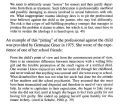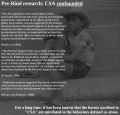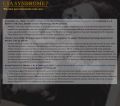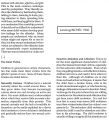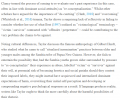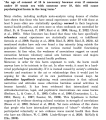One of our staff members is contributing considerably to a News Archiving service at Mu. Any well educated (Masters, PhD or above) users who wish to make comments on news sites, please contact Jim Burton directly rather than using this list, and we can work on maximising view count.
Debate Guide: Profound and lifelong scarring: Difference between revisions
The Admins (talk | contribs) No edit summary |
The Admins (talk | contribs) |
||
| Line 22: | Line 22: | ||
==External links== | ==External links== | ||
*[https://www.freespeechtube.org/v/ | *[https://www.freespeechtube.org/v/103x Video: Is sex bad for kids? (Series of videos priming against the idea)] | ||
[[Category:Debate]][[Category:Debating Points: Sociological]][[Category:Debating Points: Child/Minor]][[Category:Debating Points: Adult-Minor sex]] | [[Category:Debate]][[Category:Debating Points: Sociological]][[Category:Debating Points: Child/Minor]][[Category:Debating Points: Adult-Minor sex]] | ||
Revision as of 15:51, 4 February 2022
- "Child sexual abuse is unique, in that it almost invariably leads to lifelong mental scarring. This harm is intrinsic. They/We are victims for life".
This generalization may not be true:
- Research: Prevalence of Harm and Negative Outcomes
- Research: Family Environment
- Research: Secondary Harm
In some cases, notably the unwanted and/or coerced/cajoled activities, lifelong mental scarring is ignited by a "sexual" attack. There is also the possibility of a younger participant feeling coerced into something they dislike, because of the adult's abusive authority. This is not in any way specific to sexuality and has more to do with sexual attitudes, mores and unhealthy authority relationships. Subsequent memories can also be exacerbated by the long-lasting memory of an experience that an individual is repeatedly told to view as dirty, shameful and profound. Understandably, this can easily lead to mental disturbances and depression.
None of this implies that any form of willing physical contact/pleasure has a high capacity for harm, let alone life-long mental scarring. You could even say that what we are seeing is a social construct of abuse trauma fulfilling its own prophecy in the minds of its victims, or at the very least exacerbating fundamentally harmful abuse. This is something that any good-meaning victim advocate should be minded to investigate the possibility of, since we know from studies that the perception of ones own experiences as abusive or non-abusive is a major modifier of outcome. From this, we can conclude that changes in broader social perceptions and the promotion of youth agency over traditional authority relationships will reduce the prevalence of negative outcomes.
If a personal perspective of abuse is indicated:
One way of overcoming bad memories, may be to challenge the sex - negative foundations upon which the value judgments and feelings of shame are based. No one needs to associate their pain with their sexual history when the perceived "sexual acts" (even if coercive) are a passive vector of society's guilt. As any fair-minded therapist would tell you, that would be doing yourself a disservice and encouraging forms of neurosis that may make present relationships impossible. Therapists who encourage clients to see themselves through a sex-stigma lens as perpetual victims are probably unprincipled hacks who are in on a grift.
Excerpt Graphic Library
The EGL on Harm has some relevant information. Just right click/save and reproduce by uploading in short-form media to bypass character limits.
-
Basic Rind Paradox infographic
-
Summarized Rind findings
-
Rind and Tromovitch (2000) on Iatrogenic Harm
-
Research pointing to no intrinsic harm profiled in The Guardian
-
What victimologists say about youth perception + admissions of iatrogenic harm
-
Self-perception: Importance
-
Some reading on secondary harm and perception/situational variables
-
More secondary harms
-
Intrinsic vs secondary harm
-
Daly's 2021 repetition of Rind (1998), finds that self-perception is far more important that abuse status
-
Lahtinen Report: Most common reason for not reporting - event not serious enough
-
Bender. Sexologist's observations in 1969
-
College outcomes: Benefits of college samples
-
LGBT outcome/perception data (links to papers in this release)
-
Arreola 2009 - Psych outcomes for LGBT "CSA" identical to no sex
-
Simpler way of expressing Lesbian outcomes (ref to modern feminism)
-
Further distillation of Rind's Kinsey analysis
-
Finer analysis of Finnish Victimization Survey (Rind)
-
General reading on intrinsic harm
-
Oellerich on the self-fulfilling prophecy of iatrogenic harm
-
Oellerich comments further on iatrogenic harm
-
CSA harm was known to be confounded even before Rind
-
No "typical" CSA reaction or "syndrome"
-
Rind on methodological issues/limitations of victimology
-
The Lanning (1992) report - full of hysterical conjecture, nevertheless describes the "most common" forms of offender and victim in banal terms that are applicable to most relationships (in order to prepare investigators to pathologize banality)
-
Percy Foundation review of Chloe Taylor: "Foucault, Feminism, & Sex Crimes"
-
2022 debate response
-
Illinois state investigation finds a "pedophile" was his victims' "best friend"



